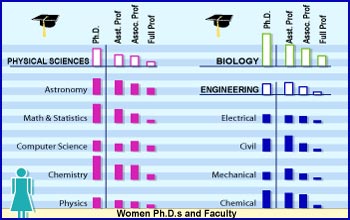|

Press Release 05-146
More Women Receive Ph.D.s, But Female Senior Faculty Are Still Rare

New study examines cultural issues that affect advancement
August 18, 2005
Despite gains over recent years in the number of women who receive Ph.D.s in science and engineering fields, a relative few go on to assume high-level faculty positions. Writing in the Aug. 19 issue of the journal Science, several top women scientists and university administrators attribute the imbalance to four pervasive elements:
- small numbers of women in the faculty pipeline
- a hostile or "chilly" campus climate toward women junior faculty
- unconscious bias that results in covert discrimination
- sacrifices to balance family and work
"While we as a nation have made considerable progress in attracting women into most science and engineering fields, we still see fewer women at the full-professor and academic leadership levels than we would expect..." said Alice Hogan, director of the National Science Foundation's (NSF) ADVANCE program, which aims to increase the representation and advancement of women in academic science and engineering careers.
"After investing in creating this pool of highly trained talent," she said, "we should see a high rate of return—productive, creative and respected teachers and researchers attracting more students into fields that might have seemed closed to them given the traditional profile of science and engineering faculty."
Lead author Jo Handelsman, a professor of plant biology at the University of Wisconsin-Madison, and her colleagues focus on the "cultural issues that manifest in the behavior of individuals and the policies of institutions because these factors make a difference and can be changed."
The article goes on to identify results from participants in the ADVANCE Institutional Transformation Program, which the authors say "appear to work."
To address the pipeline shortage, for example, Georgia Tech engineering and ADVANCE professor, Jane Ammons, has developed a "speed mentoring" workshop, in which junior faculty consult for 15 to 20 minutes with experienced, tenure-case reviewers to learn ways to strengthen their odds with tenure committees.
Meanwhile, the University of Michigan's ADVANCE program hosts workshops that include an interactive theater program that portrays typical academic situations, such as hiring, retention, and climate for women faculty in the sciences and engineering, to raise awareness of personal thoughts and behaviors that affect the campus climate toward women faculty.
Workshops at UW-Madison train members of search committees in good search methods and sensitize the participants to bias.
Although systematic examination and critique of pipeline problems, campus climate, unconscious bias and work-family juggling can be "disquieting," the report says, it is necessary to create a "scientific community reflective of the pluralist society that supports it."
In addition to Handelsman, authors of the paper include Nancy Cantor, chancellor and president of Syracuse University; Molly Carnes, a UW-Madison Medical School professor and co-director of the Women in Science and Engineering Leadership Institute; Denice Denton, chancellor of the University of California at Santa Cruz; Eve Fine of the Women in Science and Engineering Leadership Institute; Barbara Grosz, Higgins professor of natural sciences, Harvard University; Virginia Hinshaw, provost and executive vice chancellor at the University of California at Davis; Cora Marrett, senior vice president of the University of Wisconsin System; Sue Rosser, dean of the Ivan Allen College of Liberal Arts at the Georgia Institute of Technology; Donna Shalala, president of the University of Miami; and Jennifer Sheridan of the Women in Science and Engineering Leadership Institute at UW-Madison.
Read the full University of Wisconsin release.
NSF program solicitation: ADVANCE: Increasing the Participation and Advancement of Women in Academic Science and Engineering Careers
-NSF-

Media Contacts
Leslie Fink, NSF (713) 292-5395 lfink@nsf.gov
Terry Devitt, UW-Madison (608) 262-8282 trdevitt@wisc.edu
Program Contacts
Alice C. Hogan, NSF (703) 292-7238 ahogan@nsf.gov
Principal Investigators
Jo Handelsman, UW-Madison (608) 263-8783 joh@plantpath.wisc.edu

The National Science Foundation (NSF) is an independent federal agency that supports fundamental research and education across all fields of science and engineering. In fiscal year (FY) 2009, its budget is $9.5 billion, which includes $3.0 billion provided through the American Recovery and Reinvestment Act. NSF funds reach all 50 states through grants to over 1,900 universities and institutions. Each year, NSF receives about 44,400 competitive requests for funding, and makes over 11,500 new funding awards. NSF also awards over $400 million in professional and service contracts yearly.
 Get News Updates by Email Get News Updates by Email
Useful NSF Web Sites:
NSF Home Page: http://www.nsf.gov
NSF News: http://www.nsf.gov/news/
For the News Media: http://www.nsf.gov/news/newsroom.jsp
Science and Engineering Statistics: http://www.nsf.gov/statistics/
Awards Searches: http://www.nsf.gov/awardsearch/
| 


